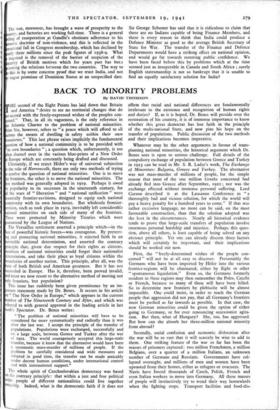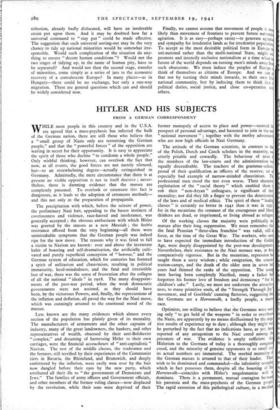BACK TO MINORITY PROBLEMS
By DAVID THOMSON •
HE second of the Eight Points has laid down that Britain and America " desire to see no territorial changes that do of accord with the freely-expressed wishes of the peoples con- med." That, in all its vagueness, is the only reference in e Atlantic Charter to the problem of national minorities. oint Six, however, refers to " a peace which will afford to all ations the means of dwelling in safety within their own oundaries." This last phrase raises implicitly the fundamental uestion of how a national community is to be provided with its own boundaries " ; a question which, unfortunately, is too ten slurred over in the various blue-prints of a New Order Europe which are constantly being drafted and discussed. Ultimately, if we reject Hitler's way of universal subjection o the rule of Herrenvolk, there are only two methods of trying o resolve the question of national minorities. One is to move e frontiers, the other is to move the national minorities. The st method was generally adopted in 1919. Perhaps it owed is popularity to its successes in the nineteenth century, for the wars of " liberation " and " national unification " were sentially frontier-revisions, designed to equip each national mmunity with its own boundaries. But wholesale frontier- vision, such as took place in 1919, inevitably left considerable ational minorities on each side of many of the frontiers. ese were protected by Minority Treaties which were aranteed by the League of Nations.
The Versailles settlement asserted a principle which—in the ace of powerful historic forces—was courageous. By preserv- g and protecting national minorities, it rejected faith in an nevitable national determinism, and asserted the contrary rinciple that, given due respect for their rights as citizens, embers of national minorities could forget their nationalist eterminism, and take their place as loyal citizens within the oundaries of another nation. This principle, after all, was the asis of both British and American greatness. But it has not cceeded in Europe. Has it, therefore, been proved invalid, d must we now resort to the alternative method of moving not my frontiers, but population?
This issue has suddenly been given prominence by an im- ortant statement made by Dr. Benes. It occurs in his article n " The New Order in Europe," which appears in the current umber of The Nineteenth Century and After, and which was ferred to with general approval in the leading article in last ek's Spectator. Dr. Benes writes: " The problem of national minorities will have to be considered far more systematically and radically than it was after the last war. I accept the principle of the transfer of populations. Populations were exchanged, successfully and on a large scale, between Greece and Turkey after the war of 1922. The world courageously accepted this large-scale transfer, because it knew that the alternative would have been a systematic mass-murder of millions of people. If the problem be carefully considered and wide measures are adopted in good time, the transfer can be made amicably under decent human conditions, under international control and with international support."
The whole spirit of Czechoslovakian democracy was based 00 the contrary principle: that within a just and free political order people of different nationalities could live together nicably. Indeed, what is the democratic faith if it does not affirm that racial and national differences are fundamentally irrelevant to the existence and recognition of human rights and duties? If, as it is hoped, Dr. Benes will preside over the restoration of his country, it is of immense importance to know whether this great democrat has lost faith in the principle of the multi-national State, and now pins his hope on the transfer of populations. Public discussion of the two methods and their implications becomes imperative.
Whatever may be the other arguments in favour of trans- planting national minorities, the historical argument which Dr. Benes uses is open to serious challenge. Full details of the compulsory exchange of population between Greece and Turkey in 1923 can be read in Mr. S. K Ladas's work, The Exchange of Minorities: Bulgaria, Greece and Turkey. The alternative was not mass-murder of millions of people, for the simple reason that most of the one million Greeks concerned had already fled into Greece after September, 1922 ; nor was the exchange effected without immense personal suffering. Lord Curzon described it at the Lausanne Conference as " a thoroughly bad and vicious solution, for which the world will pay a heavy penalty for .a hundred years to come." If that was rather excessive language, no more can be said, on the most favourable construction, than that the solution adopted was the best in the circumstances. Nearly all historical evidence tends to prove that large-scale transfers of population involve enormous personal hardship and injustice. Perhaps this ques- tion, above all others, is least capable of being solved on any abstract principle. Yet one can already discern three factors which will certainly be important, and their implications should be worked out now.
First, the " freely-determined wishes of the people con- cerned " will not be at all easy to discover. Presumably the Germans who have been imported by Hitler into the various frontier-regions will be eliminated, either by flight or other " spontaneous liquidation." Even so, the Germans formerly resident in these regions may then outnumber the Poles, Czechs or French, because so many of these will have been killed. So to determine new frontiers by plebiscite will be almost impossible. One could insist, in order to teach the German people that aggression did not pay, that all Germany's frontiers must be pushed as far inwards as possible. In that case, the new German minorities could be given the option of either going to Germany, or for ever renouncing secessionist agita. tion. But then, what of Hungary? She, too, has aggressed. But how can she absorb her three-million national minority from abroad?
Secondly, social confusion and economic dislocation after the war will be so vast that it will scarcely be wise to add to them. One striking feature of the war so far has been the masses of prisoners captured: two million Frenchmen, a million Belgians, over a quarter of a million Italians, an unknown number of Germans and Russians. Governments have col- lapsed overnight, and millions of men and women have been uprooted from their homes, either as refugees or evacuees. The Nazis have forced thousands of Czech, Polish, French and even Italian workers to move into Germany. All these masses of people will instinctively try to wend their way homeWards when the fighting stops. Transport facilities and food-dis- tribution, already badly dislocated, will have an intolerable strain put upon them. And it may be doubted how far a universal command to " stay put " could be made effective. The suggestion that such universal sorting-out may be the very chance to tidy up national minorities would be somewhat irre- sponsible. Would such complication of the situation do any- thing to ensure " decent human conditions "? Would not the two stages of tidying up, in the name of human pity, have to be separated? And would not then the second stage, transfer of minorities, come simply as a series of jars to the economic recovery of a convalescent Europe? In many places—as in Hungary—there could be no exchange, but only a one-way migration. These are general questions which can and should be widely considered now. Finally, we cannot assume that movement of people is likely than movement of frontiers to prevent future natio agitation. It is as easy—perhaps easier—to generate agita • and sympathy for irredentist lands as for irredentist populati To accept as the most desirable political form in Europe uni-national rather than the multi-national State, might w promote and intensify exclusive nationalism at a time when 'future of the world depends on turning men's minds away fr such obsessions. We must induce the peoples of Europe think of themselves as citizens of Europe. And we can that not by turning their minds inwards, to their own h national community, but by inducing them to think first political duties, social justice, and close co-operation wa others.



























 Previous page
Previous page